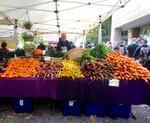
Purple and yellow carrots piled high at a Portland Saturday Market vendor stall in this Oct. 8, 2015, file photo.
Jo Mancuso / OPB
When the coronavirus pandemic hit, people who work in farm fields and food processing plants were faced with a painful decision.
“The choice was either guard their own well-being and that of their family by not going to work and losing the paycheck, or showing up to work and being more exposed to this disease than most people would be,” Ricardo Salvador, a director at the Union of Concerned Scientists, told OPB’s “Think Out Loud” on Aug. 7.
Salvador said ultimately, that was a false choice. As essential workers, most people were forced to risk their health by showing up to work. In order to keep feeding the public through coronavirus, Salvador said the U.S. should have done two things at the start of the pandemic: first, kept people working at every level of the food chain and, second, invested in protecting workers from the virus.
“We did the first, but we didn’t do the latter,” Salvador said. “We compelled them to work in places that were not safe.”
So the virus broke out among workers in meatpacking facilities, orchards, and fruit and vegetable processors all across the country, including in Oregon and Washington.
“There was a very clear calculus that even if they did get infected and if they stopped reporting for work, or worse, they died because of this, that there’s essentially an infinitely replaceable supply and therefore it didn’t really matter,” Salvador said.
The pandemic has also exposed how difficult it can be for farm owners to adapt their businesses in times of crisis.
Sarah Sullivan is the executive director of the Gorge Grown Food Network. She said that many of the small farmers she works with have worked hard to stay afloat in the last few months. Many who previously relied on restaurant sales have been selling products online and in local farmers markets.
When outbreaks at meatpacking facilities across the country caused a meat shortage, Sullivan saw demand for local meat increase substantially. But producers did not always have the ability to meet it.
“While consumers seem more committed to buying locally produced meat that is produced ethically here, locally, there is this new bottleneck in the process to get the product to market,” he said.
This bottleneck is due to a rigid structure that exists at the next level of the food system, according to Michelle Miller, associate director of the Center for Integrated Agriculture at the University of Wisconsin.
Producers typically engage with one of two separate food supply chains — a retail chain that goes to grocery stores, or a food service chain for restaurants and cafeterias.

A line cook steams hamburgers on the grill in this May 14, 2020, file photo in Stevenson, Wash. Food producers who sell to retail such as grocery stores have fared well in the pandemic while those who sell to restaurants have struggled.
Bradley W. Parks / OPB
Miller said that producers who sell to retail have generally been doing much better through the pandemic, as people continue to purchase food at grocery stores and cook at home. But many farmers who sell to food service have had to dump milk, fruit and produce with no restaurants to buy their products.
“More and more there are fewer independent businesses that are able to be more entrepreneurial and respond to crises more quickly, and we’ve had just a handful of companies owning the food supply system,” Miller said. “That concentration in the food system has been a real problem, and this just exposed it.”
Salvador said the system is mostly geared toward producing the most amount of food for the least amount of money. It is built to maximize profit for shareholders, he said, with little regard for public health, food quality, treatment of workers, or conservation of natural resources.
“The system is very efficient in terms of churning out output, but you need to be economically powerful in order to access every luxury that the system generates,” he said. “If you don’t have economic purchasing power, then the system might as well not exist.”
To address this, Sullivan thinks it’s important to strengthen hyper-local food systems to support smaller communities, especially when national systems break down in crisis.

A farmer harvests chickpeas near Kendrick, Idaho, in this Aug. 26, 2015, file photo.
Conrad Wilson / OPB
Sullivan said the local farmers markets she helps coordinate have seen produce sales increase by 27% this year, and meat sales by 97%. The markets also accept SNAP payments, and have seen a 138% increase in SNAP sales.
Salvador also thinks it’s possible that the pandemic will make us change our food systems for the better, but only if we let go of profit as our driving force.
“We could do the obvious thing which is ask ourselves, Is this decision or this model going to be good for farmers on the land?” Salvador said. “Is it going to create environments we want to raise our family in? Is it going to be healthy for us, and help us all thrive rather than suffer from chronic diseases due to the way that we eat?”
Salvador said tying government food subsidies to how companies act in the interest of the public is crucial. If businesses want to keep their subsidies, he said they should be rewarded by how well they treat workers — not how much money they make.
And on a local level, Sullivan thinks the pandemic could give us an opportunity to get used to eating food from our own communities.
“I love an avocado, but it’s actually really enjoyable to also get to eat seasonally, to look forward to what’s coming along that you haven’t had in a year,” she said. “I think there’s great potential to come out of the pandemic with a more equitable, robust food system.”
Contact “Think Out Loud®”
If you’d like to comment on any of the topics in this show, or suggest a topic of your own, please get in touch with us on Facebook or Twitter, send an email to thinkoutloud@opb.org, or you can leave a voicemail for us at 503-293-1983. The call-in phone number during the noon hour is 888-665-5865.
